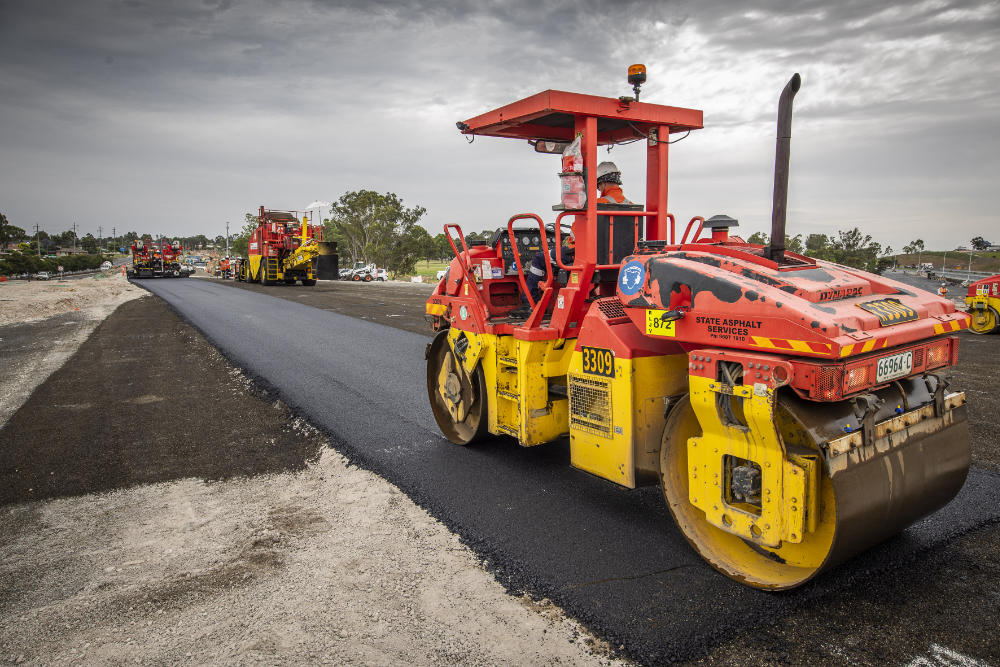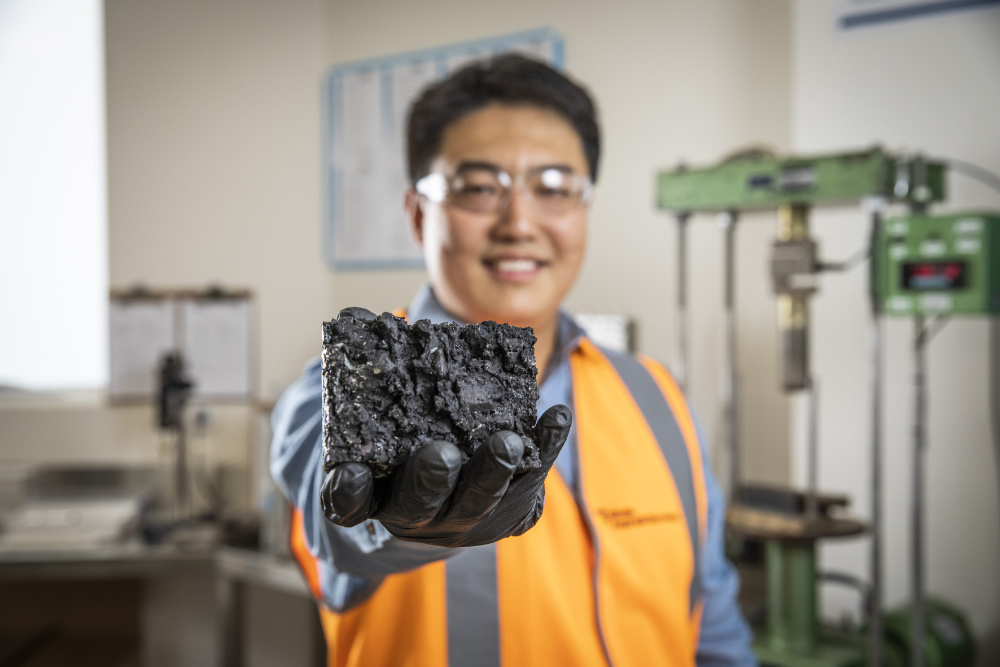The Importance and Benefits of Asphalt in Modern Infrastructure
Asphalt is fast becoming the preferred material for new road infrastructure, thanks to cost and sustainability benefits over concrete. As cities around the world expand and infrastructure projects ramp up, we’re diving into the importance of using asphalts in these projects.
Why Asphalt is the Preferred Choice for Roads
To understand why asphalt is used for modern road infrastructure, it is essential to understand its unique composition and advantages. Asphalt is a composite material made from a blend of aggregates such as sand, gravel, or crushed stone, bound together by a binder, typically bitumen. This combination results in a material that offers flexibility, durability, and cost-effectiveness, making it the go-to solution for constructing roads, parking lots, driveways, runways, and more. Compared to other materials, asphalt can better withstand temperature fluctuations and heavy traffic, which helps to minimise cracking and maintain a smooth driving surface.

The Key Advantages of Using Asphalt Over Concrete
The question of why asphalt is used for roads, rather than concrete, often arises among both industry professionals and the general public. The choice of asphalt offers several key benefits, including:
- Quick Installation and Curing: Asphalt roads can be constructed, repaired, and reopened to traffic far more quickly than concrete roads, minimising traffic disruptions and project downtime.
- Flexibility and Durability: Asphalt can flex and adapt to the movement of the ground beneath it and temperature fluctuations without breaking. This makes it ideal for high-traffic areas that require durability and resilience.
- Cost-Effective Maintenance: Repairs to asphalt surfaces, such as filling potholes and sealing cracks, are faster and more economical than the equivalent repairs for concrete surfaces.
The Benefits of Asphalt for Road Safety and Comfort
One of the major reasons why asphalt is preferred for road construction is the superior surface quality it provides. Asphalt creates a smooth, quiet surface, which contributes to increased driver safety and comfort. The noise reduction properties of asphalt pavements make them ideal for urban areas and residential neighbourhoods. Asphalt surfaces are also known to provide better skid resistance and visibility for motorists, further enhancing road safety.
Recycled Asphalt Helping Build a Sustainable Infrastructure
A major advancement in modern road construction is the incorporation of recycled asphalt. Recycled asphalt, also known as Reclaimed Asphalt Pavement (RAP), involves reprocessing and reusing old asphalt materials. By recycling and repurposing these materials, we can reduce our reliance on new, raw resources, conserve energy, and minimise waste.
Benefits of Using Recycled Asphalt:
- Environmental Impact: Recycling asphalt significantly reduces the volume of materials that end up in landfills, conserves natural resources, and lowers greenhouse gas emissions.
- Cost Savings: Using recycled materials can cut costs for both contractors and clients while maintaining high quality and performance standards.
- Performance Enhancements: Recycled asphalt can be used in new projects without compromising on durability or safety.
Modern technologies now allow for high percentages of recycled asphalt to be incorporated into new projects, making it an essential sustainable road material.

Asphalt vs. Concrete: A Closer Look at Why Asphalt Is Used
The ongoing debate between asphalt and concrete has uncovered multiple arguments for why asphalt trumps concrete in many situations, including:
- Faster Project Turnaround: Asphalt’s rapid curing time allows for faster road construction and repair, reducing traffic delays and minimising costs.
- Superior Adaptability: Concrete is prone to cracking when exposed to extreme temperature changes or movement of the subgrade. Asphalt, by contrast, can expand and contract with these changes, reducing the likelihood of damage.
- Lower Maintenance Costs: Repairs to asphalt surfaces are simpler, quicker, and less expensive. Potholes and cracks in asphalt can be easily filled, whereas concrete repairs often involve more extensive work.
The Expertise Behind Every Asphalt Project
Behind every high-quality road, driveway, or parking lot, there is a team of asphalt experts like Kypreos Group ensuring that each project meets strict quality standards. Our professionals use the latest technology and methods to deliver safe, durable, and environmentally-friendly paving solutions.
Advanced asphalt material testing laboratories also play a crucial role in evaluating the strength, composition, and performance of new asphalt mixtures. These laboratories assess the quality of recycled materials, new additives, and innovative paving solutions to ensure that every project meets or exceeds performance standards. This rigorous testing process guarantees that roads are safer, more durable, and better suited to modern infrastructure needs.
Innovations in Asphalt Technology and Sustainability
The asphalt industry is continuously evolving to meet the demands of a changing world. Innovations in asphalt production processes and techniques are helping to create more sustainable and efficient roads. Here are some key areas where technology is making a difference:
- Porous Asphalt: This type of asphalt improves drainage and reduces runoff by allowing water to pass through the surface, reducing the risk of flooding and improving road safety.
- Recycling and Reuse: As mentioned earlier, recycled asphalt plays a crucial role in reducing waste and conserving resources, while maintaining high-quality road surfaces.
- Advanced Paving Techniques: Innovations such as intelligent paving machines, which can adjust the compaction and thickness of asphalt layers automatically, ensure optimal road performance and durability.

Enhancing Road Durability with Asphalt Spray Sealing
One of the most effective techniques to enhance the lifespan of asphalt pavements is asphalt spray sealing. This process involves applying a protective layer of bitumen emulsion under the asphalt surface, shielding it from weather damage, water penetration, and wear and tear caused by heavy traffic. By using this method, road surfaces remain intact for longer, reducing the need for frequent repairs and maintenance.
Sustainable Road Materials: The Path Forward
The use of sustainable road materials is no longer just a trend; it is a necessity for reducing the environmental impact of road construction. Incorporating recycled asphalt, using porous materials, and adopting environmentally-friendly practices all contribute to more sustainable infrastructure solutions. The future of road construction lies in these innovations, ensuring that roads are not only durable but also environmentally responsible.
As such, asphalt technology is constantly evolving, making roads safer, more sustainable, and better suited to modern demands. From the use of recycled materials to cutting-edge paving techniques, the asphalt industry is dedicated to innovation and improvement. By working with asphalt experts and utilising advanced asphalt production processes, clients can be assured of durable, high-quality paving solutions that stand the test of time.
For all your paving and road construction needs, trust the experienced professionals at Kypreos Group. Contact us today to learn more about our innovative and sustainable solutions.